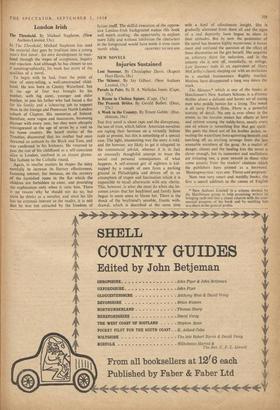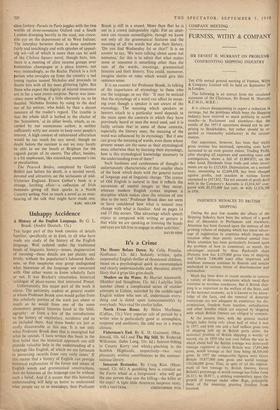NEW NOVELS
Injuries Sustained
A Room in Chelsea Square. (Cape, 15s.)
The Peacock Brides. By Gerald Bullett. (Dent, 15s.) THE first novel is about rape and the disruptions, the loss of trust, which follow. American novelists are raping their heroines on a virtually Sabine scale at present, but this is something of a special case. The light, unassuming way the story is told, and the humour, are likely to get it relegated to the commercial job-lot, whereas it is in fact an unusually thoughtful attempt to trace the social and personal consequences of what happens. A self-assured girl of eighteen is kid- napped by a couple of men from a parking ground in Philadelphia and driven off in an atmosphere of stupor and fascination which it is impossible to recall afterwards with any clarity. This, however, is what she must do when she be- comes aware that her boyfriend and family have begun in some sense to blame her. There is the shock of the boyfriend's sensible, frantic with- drawal, which is described at the same time with a kind of affectionate insight. She is gradually alienated from them all and the signs of a real depravity have begun to show in their attitudes. But by now the pessimism of the novel has become highly mysterious: it leaves moot and confused the question of the effect of these discoveries on the girl herself. She acquires an arbitrary thirst for seduction, and in the autumn she is sent off, remedially, to college. Lost Summer ends in an equivalent of Mary McCarthy's classic sleeping car with an invitation to a startled businessman. Rightly startled. Motives have disappeared a long way down the track.
The Skinner,* which is one of the books in Hutchinson's New Authors Scheme, is a dreamy thriller about a delicate and heroic set of young men who peddle heroin for a living. The mood is all early French films. There is a powerful scarcity of detail. No one is ever about in the streets as the heroine makes her efforts at love and reform among the teddy-boys, nearly every one of whom is 'something tine that got spoilt.' She peels the finest out of his leather jacket, re- vealing the waterfront hero quivering beneath and touching off an exciting revenge from the less amenable members of the gang. As a matter of danger, chases and the healing kiss the novel is clever enough, but its innocence and soulfulness are irritating too, a poor reward to those who come piously from the readers' citations which the publishers have printed as a foreword. 'Hemingwayvian; says one. 'Fierce and poignant.'
Now two very smart and worldly books, the first a sound addition to the canon of English
*INew Authors Limited' is a scheme devised by the Hutchinson group to help promising writers by bringing each one into a closer relation with the com- mercial progress of his book and by entitling him to a share in the general profits. • class fantasy. Parade in Paris juggles with the two worlds of demi-mondaine Oxford and a South London drooping heavily in the mud, one croco- dile eye on the deportment of its West Indians. The interplay between them is done somehow fairly and touchingly and with splashes of appeal- ink wit—all of which is more than can be said of the Chelsea Square novel, though here, too, there is a. meeting of alien income groups over bottomless champagne at a place known, not very misleadingly, as the Rialto. Patrick is a rich person who inveigles up from the country a sad young ingenu named Nicholas and proceeds to dazzle him with all his most glittering lights. But those who expect the dignity of injured innocence are in for a neat ironic surprise. Never was inno- cence more willing, if a little obscurely so, to be dazzled. Nicholas finishes by suing to the deaf ear of his enticer, who holds by then a decent measure of the reader's regard. The trouble is that the whole idyll is bathed in the chatter of the 'homintern,' at its sillier levels, which, as re- corded by our anonymous author, is neither sufficiently witty nor ornate to keep most people's interest. A high content of unleavened affectation would be too much for any novel, though no doubt before the summer is out we may barely be able to see the beach at Brighton for the roguish purple of its covers. The effect, besides, is a bit unpleasant, like mimicking someone's ties or peculiarities.
The Peacock ' Brides, completed by Gerald Bullett just before his death, is a second novel, devoted and attractive, on the seclusions of mid- Victorian England. Ernest Gebler's book is a strange, lurching affair—a collection of Irish humours giving off their sparks in a North Country setting. Not so much a novel as an over- hearing of the talk that might have made one.
KARL MILLER



































 Previous page
Previous page